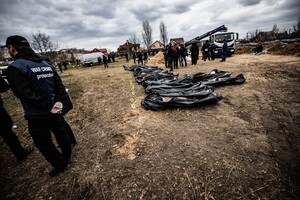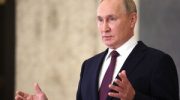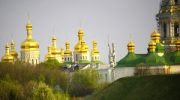It all starts with dehumanization, which lays the foundation for the destruction of people.

Terrible winter of 1932-1933 brigade of Communist Party activists went from house to house in Ukrainian villages, looking for food. These brigades came from Moscow, Kyiv and Kharkiv, as well as from neighboring villages. They dug gardens, smashed walls and used long rods to check chimneys for grain.
The Communists closely watched the smoke from the chimneys. This could mean that the family was able to hide the flour and is now baking bread. Brigades confiscated livestock and even confiscated tomato seeds. In the end, left without food, Ukrainian peasants ate rats, frogs and cooked grass. They gnawed the bark of trees and skin. Many resorted to cannibalism to survive. About 4 million people died of starvation.
Communist activists did not feel guilty at the time, writes Anne Applebaum in The Atlantic. Soviet propaganda kept telling them that the “kulaks” in the villages were “saboteurs” and “enemies of the people,” wealthy landowners who prevented the Soviet proletariat from achieving the utopia promised by the authorities. The kulaks had to be exterminated like rats or flies. And their food is to be distributed to workers in cities who have earned more than they have received. A few years later, a fugitive from the USSR, Viktor Kravchenko, wrote about his experience working in such brigades.
“To get rid of moral agony, you distance yourself from the unpleasant truth by closing your eyes and heart. You panic and excuse the facts, using words such as exaggeration and hysteria, “he explained.
Kravchenko also described how political jargon and euphemisms helped hide the reality of their activities. His colleagues spoke of the “peasant front,” the “kulak threat,” “rural socialism,” and “class struggle” to deprive those of whom they stole food of human traits. Another Soviet writer, Lev Kopelev, who also first took part in the seizure of food in the villages and later found himself in the Gulag, reacted in a very similar way. He also noticed that clichés and ideological rhetoric helped him hide from himself the truth about what he was doing.
“I convinced myself, I explained to myself. I did not have to succumb to exhausting pity. We were aware of the historical necessity. We performed a revolutionary duty, harvesting grain for the socialist homeland. For five years. No need to pity the peasants. They did not deserve to exist. Their rural wealth will soon become common property, “he wrote.
Read also: Estonia and Latvia recognized the Russian war against Ukraine as genocide
But the kulaks were not wealthy, they died of starvation. The villages were not rich, they were devastated.
“A lot of equipment and machinery, which was once so precious to their private owners, now lay broken in the open, dirty, rusty and unfit for repair. Weakened cows, smeared with manure, roamed the yards. Chickens, geese and ducks dug in flocks in unthreshed grain, “Kravchenko wrote in his memoirs many years later.
The reality he saw with his own eyes was harsh enough to be etched in his memory. . But during his communist career, he was able to convince himself otherwise.
Another Soviet writer, Vasyl Grossman, put the following words into his hero's novel Everything Flows: “I am no longer fascinated. I understand that the kulaks were just people. But why was my heart so hard then? When such horrible things were done, when so much suffering surrounded me? And the truth is that I didn't really consider them human. “They're not people, they're kulak garbage,” is what I've heard over and over again that everyone kept saying. “
Nine decades have passed since those events. The USSR no longer exists. And the works of Kravchenko, Kopelev and Grossman became available to a wide Russian audience. In the late 1980s, when Glasnost began, the authors' books, as well as other works on the crimes of the Joseph Stalin regime and the Gulag camps, were bestsellers in Russia. It used to seem that if you just told these stories, no one would ever want to do it again. Theoretically, all these books are still available. But few people buy them. The Memorial organization, which exposed the crimes of the past, was closed. There are few official museums and monuments to the victims, and they are questionable. Instead, the Russian state's ability to hide reality from its citizens and dehumanize its enemies has become more powerful than ever. Indifference to violence and immoral attitude towards mass killings is a familiar phenomenon to all who know the history of the USSR.
Today, even less violence is needed to misinform the population. There have been no such mass arrests in Putin's Russia as in Stalin's time. Maybe there's just no need for that. After all, state television, the main source of information for most Russians, is more attractive, quirky, and stylish than Stalinist-era radio broadcasts. Social networks are much more absorbing and addictive than the bad newspapers of the time. Professional trolls can help the Kremlin shape all conversations as it should and with less effort than before.
The modern Russian state has lowered the bar even lower. Instead of offering her citizens a utopia, she simply wants them to be cynical and passive. And it doesn't matter if they really believe what the state tells them. Despite the fact that the leaders of the USSR lied, they tried to make the lie seem realistic. They got angry when someone accused them of lying. They produced false “evidence” or put forward counter-arguments. In Putin's Russia, politicians and TV stars are playing a different game. They lie constantly, defiantly and openly. But if someone accuses them of lying, they do not even try to argue and counter-arguments. When a Malaysia Airlines flight MH17 was shot down in eastern Ukraine in 2014, the Russian government's response was not only denial, but numerous fabrications: plausible and absolutely impossible. They blamed the crash on the Ukrainian army or the CIA. There were crazy ideas that 298 dead bodies were put on a plane and deliberately smashed in the Donbass to discredit Russia. This constant stream of lies gave rise to absolute apathy. When there are so many explanations, how can you know what is true? And how is all this untrue?
Read also: Expleiner: Why the term “genocide” matters in Russia's war against Ukraine – AFP
Instead of promoting a communist paradise, modern Russian propaganda has devoted the last decade to enemies. Russians were told very little about what was happening in their cities. Therefore, unlike Soviet citizens, they did not have to deal with the differences between reality and fiction. Instead, they were told about places they knew nothing about and had never seen: the United States, France, Britain, Sweden, and Poland, where degeneration, hypocrisy, and “Russophobia” allegedly prevailed. A 2014-2017 survey of Russian television found that negative news about Europe appeared on Russia's state television channels an average of 18 times a day. Some of the plots were complete nonsense. For example, viewers were told that the German government “forcibly takes children from traditional families and gives them to homosexual couples.” But even the real stories were distorted to reflect the idea that life in Europe is scary and chaotic, Europeans are weak and immoral, and the EU is aggressive.
But most of the anger and fear in Russia's news is about Ukrainians. In Russian propaganda, Ukraine is a fake country, without history or legitimacy. According to Putin himself, this is only the “southwest” of Russia, an integral part of Russia's “history, culture and spiritual space.” Both the fallen and doomed West are allegedly building “anti-Russia” in this false country. The Russian autocrat constantly says that Ukraine is “under full external control” and that it has in fact become “a colony with a puppet regime.” Putin claims that he invaded Ukraine to protect Russia “from those who took Ukraine hostage and tried to use it against our country and our people.”
In reality, Putin has invaded Ukraine to turn it into his own puppet colony because he doesn't want it to be anything else. His imagination as a KGB agent precludes the possibility of real politics, popular movements or even public opinion. The rhetoric of Putin and Russian television commentators suggests that Ukrainians have no will. They are not able to choose something themselves. They cannot elect a government. And in general, they are not people, but “Nazis”. So, like the kulaks of the past, they must be ruthlessly destroyed.
The link between genocidal rhetoric and genocidal behavior is not automatic or at least predictable. People can insult, demonize and verbally humiliate each other without trying to kill someone. But while not every genocidal speech leads to real genocide, all genocides began with such speeches.
“Modern Russian propaganda has become an ideal tool for both massacres and hiding them from society. Gray apparatchiks, FSB agents and well-dressed TV presenters have been preparing their national citizens for years to prepare their fellow citizens so that they will not feel any pity for Ukraine. And they succeeded, “the article reads.
From the very first day of the war, there was evidence that the Russian army was preparing to kill, maim, or evict many, perhaps millions, of Ukrainians. In the past, brutal attacks on cities such as Dresden, Coventry, Hiroshima and Nagasaki took place only after years of terrible conflict. Instead, the systematic bombing of civilians in Ukraine began days after the start of the unprovoked invasion. In the first week, Russian missiles and artillery began destroying residential neighborhoods, hospitals and schools. And if the Russians occupied a city, they kidnapped or killed the mayor, local deputies, and in Mariupol – even the director of the museum. They did not spare bullets for ordinary people.
Read also: “Bucha is a landscape of horror”: The New York Times published a map of the killing of civilians
When the Ukrainian army recaptured Bucha, it found corpses with their hands tied and thrown into mass graves. During the first three weeks of the war, Human Rights Watch documented mass executions, rapes, and mass robberies of civilians. Mariupol, a city with a predominantly Russian-speaking population the size of Miami, has been almost completely destroyed. In an interview in March, President Volodymyr Zelensky noted that in previous wars in Europe, the occupiers did not destroy everything because they themselves needed somewhere to cook, eat and wash. During the Nazi occupation of France, “cinemas” worked. But in Mariupol “burned everything”. 90% of the buildings were destroyed in just a few weeks.
But despite the fact that all these crimes took place in front of the whole world, the Russian state media were able to successfully hide the tragedy from their own people. As in the past, political jargon helped. After all, it is not a war, but a “special military operation.” And these were not mass murders of Ukrainians, but “protection” of the inhabitants of the eastern Ukrainian regions. There is allegedly no genocide, it is just protection “from the genocide that staged the regime in Kyiv.” The dehumanization of Ukrainians ended in early April, when the state agency RIA Novosti published an article claiming that the “denazification” of Ukraine required the “liquidation” of the Ukrainian leadership and the destruction of the country's name. Because to be a Ukrainian is to “be a Nazi.”
“Ukrainianism is an artificial anti-Russian construct that has no civilizational context of its own and is completely subservient to foreign and foreign civilizations,” the article said. p>
And everyone who was able to see the photo from Mariupol was quickly “explained”. On March 23, Russian television showed footage of the city's ruins taken by CNN reporters. But Ukrainians were blamed for everything. The Russian TV presenter spoke about the “terrible picture”. Like, “Ukrainian nationalists, retreating, are trying not to leave a stone unturned.” The Russian Ministry of Defense accused the Azov Battalion of destroying a theater in Mariupol, where hundreds of families with children were hiding from Russian bombing. Why should Ukrainian “nationalists” kill Ukrainian children? Nobody explained it. But in the end, nothing can be explained. So, if nothing is known for sure, then no one is to blame. It is possible that the “Ukrainian nationalists” destroyed Mariupol. And maybe not. According to the logic of Russian propaganda, it is impossible to establish for sure. So no one is responsible for that.
No one in Russia is tormented by conscience. Published recordings of intercepted telephone conversations of Russian soldiers with their relatives are full of contempt for Ukrainians. Soldiers talk about stealing TVs, drinking cognac and shooting people in the woods. They are not worried about losses: even among their own. All this – indifference to violence, immoral calm attitude to mass killings and even contempt for the lives of Russian soldiers – is well known to all who know the history of the USSR. But Russian citizens and Russian soldiers equally do not know this story and they sneeze. In an interview with Applebaum in April, Zelensky said that “just as alcoholics do not admit that they are alcoholics, these Russians are afraid to admit their guilt.”
There was no retribution for the Holodomor, the Gulag, or the Great Terror of 1937-1938. There was not a moment when the criminals at least formally repented. And here is the result. Except for the Kravchenkos and Kopelevs, most Russians agree with the state's explanations of the past and live on.
“They're not people, they're kulak garbage,” they once said to themselves.
“
They are not people, they are Ukrainian Nazis,” the Russians are telling themselves now.
See the special topic: More than 80% of citizens consider “ordinary Russians” guilty of invading Ukraine – Info Sapiens According to a recent poll, more and more Ukrainians condemn the tacit consent of “ordinary Russians” to the actions of their despotic authorities. The Pentagon will expand training for the Ukrainian military – US State Department Defense Secretary Lloyd Austin also stressed that the United States will continue to supply the necessary weapons to the Ukrainian army. Russia has concentrated 58 cruise missiles in the Black Sea – Motuzyanyk In the Belgorod region of Russia, the concentration of additional units has been observed. A documentary based on the Chernobyl events will be released in Ukraine: a teaser has been published A new accident at the station could develop according to the Fukushima nuclear power plant scenario. The occupiers released the leaders of two communities in Zaporizhia Ivan Senyk and Ivan Maleev were abducted this month.


